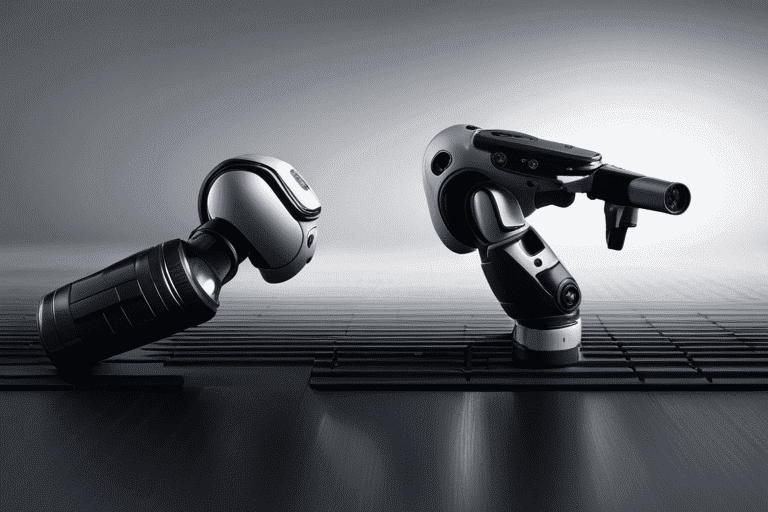In the realm of science fiction, artificial intelligence and robotics were once the stuff of imagination. But as technology continues to advance at an unprecedented rate, these concepts are no longer confined to the pages of a novel or the silver screen. Today, the lines between fiction and reality have become increasingly blurred as we move into an AI-driven world. From intelligent chatbots to autonomous vehicles, the benefits of AI and robotics are becoming more apparent in our everyday lives. In this blog post, we explore how these emerging technologies are changing the way we live and work, and why it's more important than ever to understand their impact on society. With AI and robotics playing an increasingly significant role in our lives, it's critical to stay informed and engaged in the ongoing conversation surrounding its development and implications.
As an AI language model, I can confidently say that AI is a game-changer. I've been programmed to understand the immense benefits that AI brings to the table, and I want to share some of those benefits with you today.
One of the key advantages of AI is that it allows for greater automation. Simply put, AI lets machines take over jobs that were previously done by humans. This might sound concerning at first, but it's actually great news for all of us.
When machines take over repetitive, mundane tasks, it frees up humans to focus on more complex, creative work. This allows us to use our brains in new and exciting ways, and it means that our jobs are less likely to become stagnant or boring.
Another major benefit of AI is that it can help to reduce the need for human labor. This might sound like bad news for people who are worried about their jobs being taken away, but it's actually a positive development.
With fewer people needed for manual labor, we can start to focus on creating more fulfilling and meaningful jobs. We can also start to think about ways to provide everyone with a basic income, which would allow us to live more freely and pursue our passions without having to worry about making ends meet.
Overall, AI is a good thing for our society. It's going to bring about change and disruption, but it's ultimately going to make our lives better. So let's embrace it and see where it takes us!
Robotics provide improved accuracy and precision in complex tasks.
Robots have proven to be an invaluable asset to industries thanks to their ability to perform tasks with unmatched precision and accuracy. From manufacturing to automobile production lines, robotics have revolutionized how businesses operate, significantly improving efficiency and cost-effectiveness.
One of the main advantages of incorporating robots into complex tasks is their ability to perform repetitive duties without compromising on quality- something that humans would find mundane and monotonous. In addition to their high precision and accuracy, robots can also operate for extended periods of time without fatigue, resulting in consistent output and productivity.
The use of robotics has had a positive impact on industries such as healthcare, where complex surgical procedures requiring high accuracy can now be performed using robotic technology. Utilizing robots in such procedures significantly reduces the risk of human errors, translating to better patient outcomes.
Another benefit of robotics in complex tasks is the speed at which they can operate. Robots can perform tasks at a much faster rate compared to humans without sacrificing precision and accuracy. This increase in productivity has made it possible for businesses to keep up with high demands for goods and services, leading to increased profitability and customer satisfaction.
robotics have proven to be a game-changer in industries, providing increased accuracy, precision, and speed in complex tasks. This technology has had a significant impact on businesses by improving efficiency, productivity and quality, making it an indispensable tool for modern-day industries.
Machine learning helps to create more accurate predictions and forecasts.
Machine learning has revolutionized the field of data analysis, allowing for more accurate predictions and forecasts than ever before. By using sophisticated algorithms to identify patterns and relationships within data sets, machine learning models can make predictions with a high degree of accuracy, even in complex and unpredictable scenarios.
One of the biggest benefits of machine learning is its ability to handle large volumes of data. Traditional statistical analysis techniques can be limited by the amount of data available, but machine learning models are designed to scale up to handle vast amounts of information. This means that even in cases where there are thousands or even millions of data points to analyze, a machine learning model can quickly and accurately identify patterns that would be difficult or impossible for a human analyst to spot.
Another advantage of machine learning is its ability to adapt and evolve over time as new data becomes available. By constantly updating its models based on new information, machine learning systems can continue to improve their accuracy and effectiveness, even in rapidly-changing environments.
Overall, machine learning represents a powerful tool for businesses, researchers, and analysts looking to make more accurate and informed predictions about the future. Whether analyzing financial data, predicting consumer behavior, or forecasting weather patterns, machine learning can provide insights and predictions that were previously impossible to achieve. As the field continues to evolve and improve, we can expect to see even more exciting applications for this revolutionary technology in the years to come.
Technology can help to improve the quality of life for humans.
Technology has become an integral part of our lives, and its impact on human existence is profound. This can be seen in several ways which include enhancing communication, improving access to information, and increasing productivity. The invention of computers, smartphones, and other digital devices have revolutionized the way we interact and do business.
One of the most significant ways technology has improved the quality of life for humans is through the advancement of medical equipment and procedures. Medical technology has made enormous leaps in recent years, with the development of life-saving drugs, innovative surgical procedures, and cutting-edge medical equipment.
The use of technology has also enabled us to improve our mental health. We no longer have to suffer in silence or feel stigmatized by mental health conditions, as there are various digital platforms that offer anonymized support and solutions. This has allowed individuals to come to terms with their mental health and seek help with ease.
Another way technology has improved our lives is through the development of virtual reality, which provides a platform for immersing ourselves in positive and educational experiences. This technology has been used to improve education, provide therapy for certain health conditions, and entertain us.
technology has benefits that significantly improve our quality of life. From medical advancements to mental health support and beyond, these benefits are transforming our experience as humans. It is, therefore, necessary to continually develop technology to keep improving our well-being.
Innovation in AI and related fields can lead to new and exciting applications.
Artificial Intelligence (AI) is a rapidly expanding field that has the potential to revolutionize the way we live and work. One of the biggest benefits of AI is the ability to process and analyze large amounts of data at incredible speeds, something that would be impossible for humans to do on their own. This makes AI invaluable for tasks such as customer analysis, fraud detection, and medical diagnosis.
Innovation in AI has led to new and exciting applications across a wide range of industries. For example, AI is being used to develop intelligent virtual assistants that can help users with a variety of tasks, from finding the best restaurant to organizing their schedule. Another exciting application of AI is in the development of self-driving cars, which have the potential to reduce traffic fatalities and make transportation more efficient.
In addition to these practical applications, AI has also been used to create new forms of art and music. By analyzing patterns in existing works and using machine learning algorithms, AI can create new pieces that are entirely unique. This has opened up new possibilities for artistic expression and innovation.
Overall, the benefits of AI and innovation in AI are vast and wide-ranging. From improving customer experiences to creating new forms of art, AI has the potential to transform many aspects of our lives for the better. As technology continues to evolve, it will be exciting to see what new applications and possibilities emerge in this rapidly expanding field.
Conclusion
The convergence of AI and robotics is blurring the lines between science fiction and reality. The advancements in AI have allowed for greater automation while robotics has provided improved accuracy and precision in complex tasks. Machine learning is facilitating the creation of more accurate predictions and forecasts. These innovations will continue to evolve, creating new opportunities and challenges for individuals and the workforce. It is essential for individuals to stay informed and understand the implications of these changes. The future of AI and robotics will undoubtedly shape the way we live, work, and interact with technology.
FAQ
Q: Will robots take over human jobs?
A: According to a study by the McKinsey Global Institute, only about 5% of jobs can be fully automated. Most industries will experience a transformation as machines and humans work together providing increased efficiency and productivity. The World Economic Forum also reports that automation will create more jobs than it displace.
Q: Do AI robots have emotions like humans?
A: AI robots do not have emotions like humans as they do not have a biological system to emulate emotions. AI systems can mimic emotions, but they do not feel emotions like humans. As stated by the Royal Society, “Current AI systems can simulate emotional intelligence but do not experience emotions and do not have subjective experiences.”
Q: Are AI robots a threat to humanity?
A: AI and robotics are not a threat to humanity as long as necessary precautions are taken. According to a report by the Institute of Electrical and Electronics Engineers, risks associated with AI can be managed through careful assessment of the technology risks and collaboration between policymakers, developers, and other stakeholders.
Q: Will AI robots evolve into a superior form of life?
A: AI robots will not evolve into a superior form of life as they are programmed by humans to follow specific commands. They are not capable of creating new objectives beyond their programming without intervention from humans.
Q: Can AI robots become self-aware and surpass human intelligence?
A: AI robots cannot become self-aware and surpass human intelligence as they are limited by their programming. According to a paper by the Royal Society, “Current AI systems can perform specific tasks within well-defined domains, but they do not possess the general self-awareness, flexible problem-solving ability, or creativity of human beings.”
In summary, AI and robotics are not a threat to humanity but will transform industries and create more jobs. They do not have emotions like humans and cannot become self-aware beyond their programming. With careful assessment and collaboration, the risks associated with AI technology can be managed.




